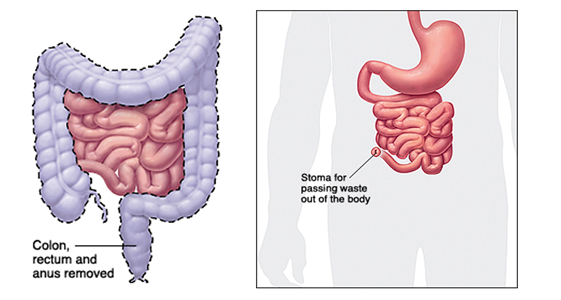Having Bowel Surgery: Proctocolectomy with Permanent Ileostomy
This surgery is done to treat diseases of the digestive tract. It removes all of your large intestine. When healed, waste passes from your small intestine through an opening (stoma) in your belly (abdominal) wall and into a pouch outside of your body.
There are two ways the surgery may be done. Your healthcare provider can discuss which option will be best for you.
- Open surgery. This is a traditional surgery. It is done through a large cut (incision).
- Laparoscopic surgery. This is a minimally invasive surgery. It is done through small incisions.
|
Risks and complications
Bowel surgery has certain risks and possible complications. Your health care provider can discuss them with you. They may include:
· Infection
· Injury to nearby organs
· Blood clots
· Risks related to anesthesia
· Complications at the stoma area such as bleeding, blockage, or a hernia
|
Getting ready for surgery
Follow any instructions about getting ready from your healthcare provider. Preparation may begin a few weeks before surgery and can include the following:
- If you smoke, try to quit.
- Tell your provider about any medicines you are taking. You may need to stop taking all or some of these before your surgery. This includes:
-
- Prescription medicines
- Aspirin and over-the-counter pain and fever medicines known as nonsteroidal anti-inflammatory drugs (NSAIDS) as well as blood-thinning medicines (anticoagulants)
- Street drugs
- Herbs, vitamins, and other supplements
- If you drink alcohol, tell your provider how much. This is very important if you are a heavy drinker. Alcohol withdrawal can be life threatening. So be honest with your provider.
- If you will have a stoma, a specially trained healthcare provider will meet with you. This provider will be called an enterostomal therapy (ET) nurse or a wound, ostomy and continence (WOC) nurse.
- This ostomy nurse will evaluate and help guide the placement of the stoma. However, the actual site the stoma is placed will be determined by the surgeon during the surgery based on what they find in the operating room (OR).
- The site may change but usually an ileostomy is usually placed in the right lower part of the belly.
- After the surgery, the ostomy nurse will see you and answer any questions you have. He or she will also teach you (and your family/significant others if you wish) about caring for the ostomy.
- Follow any directions you are given for taking medicines and for not eating or drinking before surgery. This includes any instructions for bowel prep.

The procedure
- The entire colon and rectum are removed. The anus is also removed.
- The provider then forms a stoma. The small intestine is sewn to an opening in the belly wall to let waste leave the body.
© 2000-2019 The StayWell Company, LLC. 800 Township Line Road, Yardley, PA 19067. All rights reserved. This information is not intended as a substitute for professional medical care. Always follow your healthcare professional's instructions. This information has been modified by your health care provider with permission from the publisher.